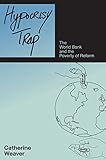Hypocrisy Trap : The World Bank and the Poverty of Reform / Catherine Weaver.
Material type: TextPublisher: Princeton, NJ : Princeton University Press, [2008]Copyright date: ©2009Edition: Course BookDescription: 1 online resource (288 p.) : 4 line illus. 5 tablesContent type:
TextPublisher: Princeton, NJ : Princeton University Press, [2008]Copyright date: ©2009Edition: Course BookDescription: 1 online resource (288 p.) : 4 line illus. 5 tablesContent type: - 9780691138190
- 9781400837816
- 332.1/532
- HG3881.5.W57
- online - DeGruyter
- Issued also in print.
| Item type | Current library | Call number | URL | Status | Notes | Barcode | |
|---|---|---|---|---|---|---|---|
 eBook
eBook
|
Biblioteca "Angelicum" Pont. Univ. S.Tommaso d'Aquino Nuvola online | online - DeGruyter (Browse shelf(Opens below)) | Online access | Not for loan (Accesso limitato) | Accesso per gli utenti autorizzati / Access for authorized users | (dgr)9781400837816 |
Browsing Biblioteca "Angelicum" Pont. Univ. S.Tommaso d'Aquino shelves, Shelving location: Nuvola online Close shelf browser (Hides shelf browser)

|

|

|

|

|

|

|
||
| online - DeGruyter Why? / | online - DeGruyter The Presidency in the Era of 24-Hour News / | online - DeGruyter Analyzing the Global Political Economy / | online - DeGruyter Hypocrisy Trap : The World Bank and the Poverty of Reform / | online - DeGruyter Military Power : Explaining Victory and Defeat in Modern Battle / | online - DeGruyter The Steps to War : An Empirical Study / | online - DeGruyter Philosophical Essays. Volume 1, Philosophical Essays, Volume 1 ; Natural Language: What It Means and How We Use It / |
Frontmatter -- Contents -- Figures and Tables -- Preface -- Abbreviations -- Chapter One. Introduction: Hypocrisy and Change in the World Bank -- Chapter Two. The World Bank Hypocrisy Trap -- Chapter Three. The World's Bank and the Bank's World -- Chapter Four. Good Governance and Anticorruption: From Rhetoric to Reality? -- Chapter Five. The Poverty of Reform -- Chapter Six. The Fog of Development -- Interviews and Personal Correspondence -- References -- Index
restricted access online access with authorization star
http://purl.org/coar/access_right/c_16ec
As the preeminent international development agency for the past sixty years, the World Bank has attracted equal amounts of criticism and praise. Critics are especially quick to decry the World Bank's hypocrisy--the pervasive gaps between the organization's talk, decisions, and actions. In the wake of the Paul Wolfowitz leadership scandal in May 2006, perceptions of hypocrisy have exacted a heavy toll on the Bank's authority and fueled strong demands for wide-scale reform. Yet what exactly does the hypocrisy of the World Bank look like, and what or who causes it? In Hypocrisy Trap, Catherine Weaver explores how the characteristics of change in a complex international organization make hypocrisy difficult to resolve, especially after its exposure becomes a critical threat to the organization's legitimacy and survival. Using a rich sociological model and several years of field research, Weaver delves into the political and cultural worlds within and outside of the Bank to uncover the tensions that incite and perpetuate organized hypocrisy. She examines the sources and dynamics of hypocrisy in the critical cases of the Bank's governance and anticorruption agenda, and its recent Strategic Compact reorganization. The first book to unravel the puzzle of organized hypocrisy in relation to reform at the World Bank, Hypocrisy Trap ultimately enriches our understanding of culture, behavior, and change in international organizations.Some images inside the book are unavailable due to digital copyright restrictions.
Issued also in print.
Mode of access: Internet via World Wide Web.
In English.
Description based on online resource; title from PDF title page (publisher's Web site, viewed 30. Aug 2021)


